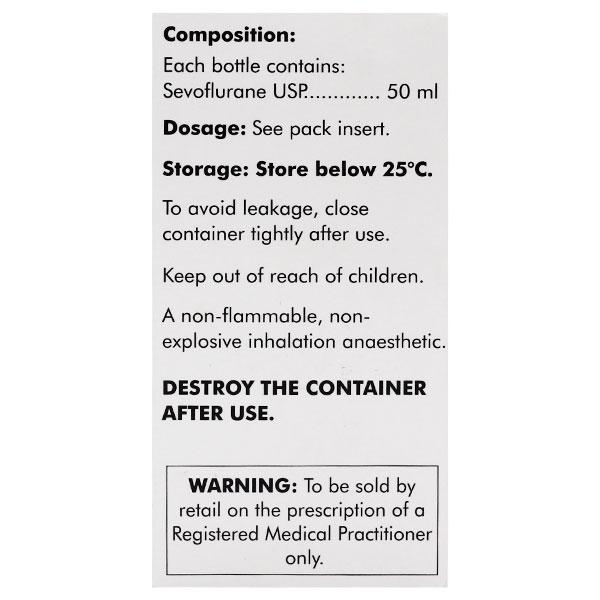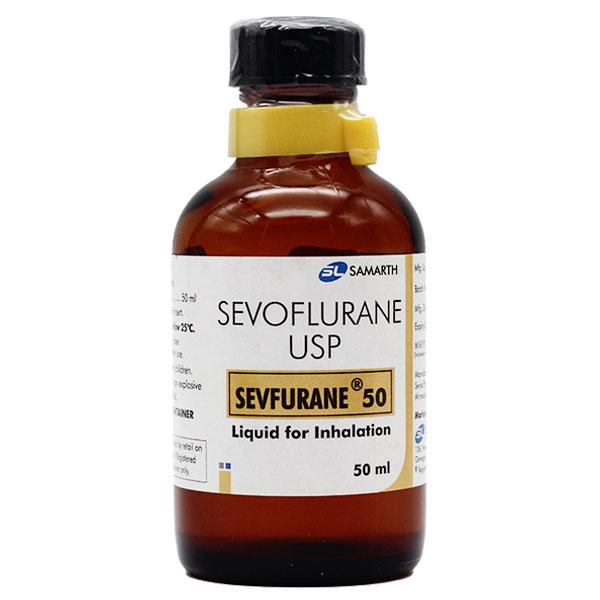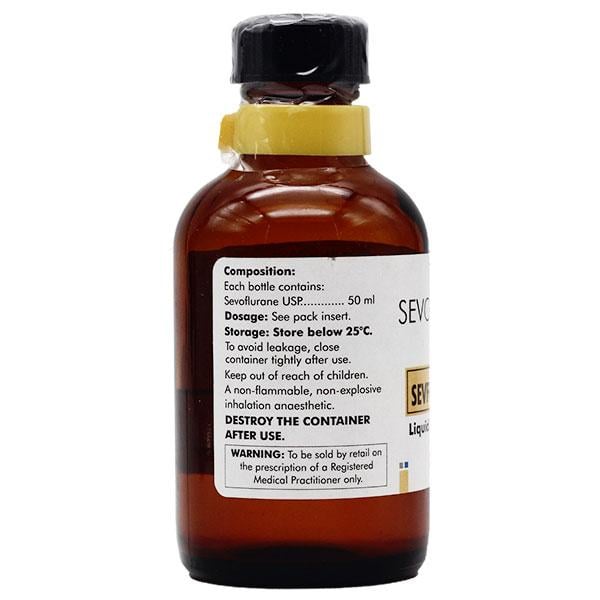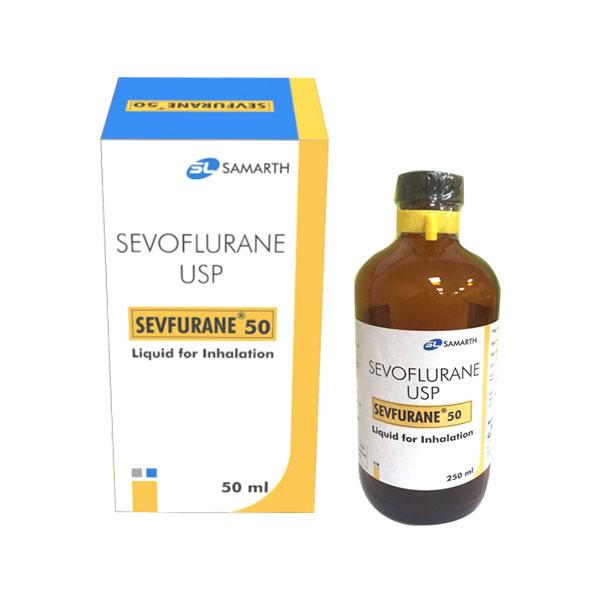

Netmeds First Membership
Quick Links
Introduction About SEVFURANE 50 LIQUID FOR INHALATION
SEVFURANE 50 LIQUID FOR INHALATION contains Sevoflurane, which belongs to the group of medicines called Anesthetics. It is used to induce and maintain a deep, pain-free sleep (general anesthesia) in adults and children during an operation.
SEVFURANE 50 LIQUID FOR INHALATION is not recommended for use in patients with liver disease, QT prolongation, or torsade de pointes, which may also be associated with QT prolongation. Consult your doctor before using it.
SEVFURANE 50 LIQUID FOR INHALATION should be used with caution in patients with kidney disease, respiratory depression (breathing difficulties), heart disease, low blood pressure or low blood volume or blood circulation problems, or coronary artery disease. Consult your doctor before using it.
If you are pregnant, trying to become pregnant, or are breast-feeding. Consult your doctor before receiving SEVFURANE 50 LIQUID FOR INHALATION, as the safety of this medicine in pregnancy and breastfeeding is not known.
The most common side effects of receiving SEVFURANE 50 LIQUID FOR INHALATION are restlessness, slow heart rate, low blood pressure, coughing, nausea and vomiting, and delirium. Consult your doctor if any of the side effects worsen.
Uses Of SEVFURANE 50 LIQUID FOR INHALATION
- To induce and maintain a deep, pain-free sleep (general anesthesia) in adults and children during an operation.
How SEVFURANE 50 LIQUID FOR INHALATION Works
SEVFURANE 50 LIQUID FOR INHALATION work by temporarily reducing the activity of the body’s central nervous system. This causes a complete loss of sensation in the body, including loss of consciousness, allowing surgery to be carried out without pain or distress.
How to use SEVFURANE 50 LIQUID FOR INHALATION
SEVFURANE 50 LIQUID FOR INHALATION will be given to you by an anesthetist. Sevoflurane liquid is changed to gas in a vaporizer, and you will then breathe this in as a vapor. It may be used to put you to sleep before your operation, or if you are put to sleep with an injection, it may be used to maintain anesthesia during the operation. Your doctor will decide the correct dose, duration, and frequency for you depending on the type of operation, etc.
Side Effects Of SEVFURANE 50 LIQUID FOR INHALATION
Common
- restlessness
- slow heart rate
- low blood pressure
- coughing
- nausea and vomiting
- delirium
- drowsiness, dizziness
- headache
- fast heart rate
- increased blood pressure
- shallow breathing
- throat spasm, respiratory problems
- watering mouth
- chills, fever
- abnormal blood sugar (glucose) level
- abnormal liver function test or white blood cell count
- fluoride level increased
- abnormally low body temperature
Uncommon
- heart disorders (AV block) causing dizziness
- confusion
- abnormal heart rhythm and abnormal heart beats
- AV blockade (a disorder of the electrical conduction of the heart)
- stopping breathing, low oxygen levels, fluid on the lungs
- retention of urine, glucose in the urine
- increased blood creatinine levels (an indicator of poor kidney function)
Rare
Stop using SEVFURANE 50 LIQUID FOR INHALATION and contact your doctor immediately if you experience any of the following side effects:
- Allergic reactions such as swelling of the face, tongue, and throat and difficulty breathing
- Malignant hyperthermia (very high temperature)
- Increased potassium levels in the blood (hyperkalaemia), which may result in abnormal heart rhythms and can be fatal in children during the post-operative phase. Particularly in patients with neuromuscular disease, particularly Duchenne muscular dystrophy.
How To Manage Side Effects
Dizziness Or Drowsiness
Drink plenty of fluids to stay hydrated, as dehydration can cause dizziness, especially in hot weather or after exercise. Eat regular, balanced meals to maintain stable blood sugar levels. Avoid skipping meals or consuming high-sugar foods that can cause rapid fluctuations. If you feel dizzy, sit or lie down immediately to prevent falling or injury. Rest in a comfortable position until the dizziness passes. Move slowly and avoid sudden changes in position, such as standing up quickly, which can worsen dizziness. Improve sleep hygiene by going to bed and waking up at the same time each day, even on weekends, to regulate your sleep patterns. Engage in regular physical activity, but avoid vigorous exercise close to bedtime, as it may interfere with sleep. Avoid consuming caffeine in the late afternoon or evening, as it can interfere with your ability to fall asleep. Consult your doctor if dizziness persists.
Headache
Stay hydrated by drinking enough water throughout the day. Avoid skipping meals and try to maintain a balanced diet. Limit caffeine intake. Incorporate stress-relief techniques such as deep breathing, meditation, or yoga into your daily routine. Apply a cold or warm compress to your forehead or the back of your neck for headaches. Rest in a dark, quiet room. Peppermint or lavender oil can be applied to the forehead to help alleviate headache symptoms. Get adequate sleep and maintain a regular sleep schedule. Engaging in regular physical activity can help reduce the frequency and severity of headaches. Reduce eye strain by taking regular breaks from screens and adjusting your screen settings for better comfort. Manage stress by staying organized and breaking tasks into smaller, manageable parts. Consult your doctor if the headache persists.
Nausea And Vomiting
Try to eat smaller amounts of food more frequently throughout the day. This can help prevent your stomach from being too empty or too full. Stick to bland, easy-to-digest foods like crackers, toast, rice, or bananas. These are less likely to irritate your stomach. Avoid greasy or spicy foods, as they can exacerbate nausea. Drink clear fluids like water, broth, or herbal teas. Sipping ginger or peppermint tea can help soothe your stomach and reduce nausea. Avoid caffeinated, alcoholic, or very sugary drinks. Avoid strong odors, as they can trigger or worsen nausea. Try to stay in well-ventilated areas and avoid strong scents. Consult your doctor if the nausea and vomiting worsen.
Warning & Precautions
Pregnancy
Consult your doctorIf you are pregnant or trying to become pregnant, consult your doctor before receiving SEVFURANE 50 LIQUID FOR INHALATION, as the safety of this medicine in pregnancy is not known.
Breastfeeding
Consult your doctorIf you are breast-feeding, consult your doctor before receiving SEVFURANE 50 LIQUID FOR INHALATION, as the safety of this medicine in breast-feeding is not known. Breast-feeding should be avoided for 48 hours after administration of SEVFURANE 50 LIQUID FOR INHALATION and breast milk discarded during that period.
Driving and Using Machines
Use with CautionSEVFURANE 50 LIQUID FOR INHALATION may affect your ability to drive or use machines for some time after administration. Therefore, you should not drive or operate machinery until your doctor advises that you may do so.
Alcohol
Consult your doctorAvoid alcohol consumption while taking SEVFURANE 50 LIQUID FOR INHALATION.
Kidney
Use with CautionSEVFURANE 50 LIQUID FOR INHALATION should be used with caution in patients with kidney disease. Consult your doctor before using it.
Liver
ContraindicatedSEVFURANE 50 LIQUID FOR INHALATION is not recommended for use in patients with liver disease. Consult your doctor before using it.
Allergy
ContraindicatedSEVFURANE 50 LIQUID FOR INHALATION is not recommended for use if you are allergic to sevoflurane, any other anesthetics, or any of the other ingredients.
Lungs
Use with CautionSEVFURANE 50 LIQUID FOR INHALATION should be used with caution in patients with respiratory depression (breathing difficulties) or who have taken medicines that cause respiratory depression.
Heart Disease
Consult your doctorSEVFURANE 50 LIQUID FOR INHALATION is not recommended for use if you have ever had QT prolongation (prolongation of a specific time interval in an ECG) or torsade de pointes (a specific type of heart rhythm), which may also be associated with QT prolongation. It should be used with caution in patients with heart disease, low blood pressure or low blood volume, or who have blood circulation problems or coronary artery disease. Consult your doctor before using it.
Use In Pediatrics
Consult your doctorYour doctor will decide the correct dose, duration, and frequency for you depending on the type of operation, etc.
Use In Geriatrics
Consult your doctorYour doctor will decide the correct dose, duration, and frequency for you depending on the type of operation, etc.
Others
SEVFURANE 50 LIQUID FOR INHALATION is not recommended for use if:
- You have been told previously that you should not receive general anesthesia
- You or any member of your family has experienced a condition called malignant hyperthermia (a rapid rise in body temperature) during an operation with Sevoflurane or any other anesthetic
- You are undergoing dental procedures outside a hospital or daycare unit
- Are prone to or at risk of seizures (fits)
- Have a mitochondrial disorder (Ex. Leigh’s syndrome)
Before receiving SEVFURANE 50 LIQUID FOR INHALATION, inform your doctor if you:
- Have brain problems
- Have severe headaches
- Have nausea and vomiting
- Have received Sevoflurane or any other anesthetics within the last three months
- Are at risk of increased intracranial pressure (rise in pressure inside the skull), such as from a head injury or brain tumour
- Are undergoing an obstetrical operation
- Have seizures or seizure disorders (fits)
- Have Pompe’s disease (a metabolic disorder)
- Have a severe muscle disorder such as Duchenne muscular dystrophy, myasthenia gravis
- Have Down syndrome
Interactions
A. Drug-Drug interactions:
Inform your physician if you are taking any of the following drugs before using SEVFURANE 50 LIQUID FOR INHALATION:
- Opioid analgesics (Ex. morphine, codeine, alfentanil, and sufentail)
- muscle relaxants (Ex. succinylcholine, vecuronium, pancuronium, atracurium)
- Central nervous system stimulant (Ex. amphetamine)
- Cardiovascular agents (Ex. atenolol, propranolol, verapamil, dihydropyridine)
- Antitubercular (Ex. isoniazid)
- Antidepressants (Ex. isocarboxazid, St. John’s Wort)
- Decongestants (ephedrine)
- Benzodiazepines (Ex. alprazolam, diazepam, lorazepam)
- Barbiturates (Ex. phenobarbital)
- Anesthetic (Ex. nitrous oxide)
- sympathomimetics (such as isoprenaline, adrenaline, and noradrenaline).
Overdose:
As SEVFURANE 50 LIQUID FOR INHALATION is given to you by an anesthetist, an overdose is unlikely, but if this were to occur, your anesthetist or doctor will manage and treat you at the time.
Synopsis
| Drug | : | Sevoflurane |
| Pharmacological Category | : | Anaesthetics |
| Therapeutic Indication | : | To induce and maintain a deep, pain-free sleep (general anesthesia) |
| Dosage Forms | : | Inhaler, Liquid, Liquid for Inhalation, Solution |
More Information
Storage
- Keep SEVFURANE 50 LIQUID FOR INHALATION out of reach of children
- Store SEVFURANE 50 LIQUID FOR INHALATION below 25°C.
FAQs About SEVFURANE 50 LIQUID FOR INHALATION
Q: What is SEVFURANE 50 LIQUID FOR INHALATION used for?
A: SEVFURANE 50 LIQUID FOR INHALATION is used to induce and maintain a deep, pain-free sleep (general anesthesia) in adults and children during an operation.
Q: What are the side effects of SEVFURANE 50 LIQUID FOR INHALATION?
A: The most common side effects of receiving SEVFURANE 50 LIQUID FOR INHALATION are restlessness, slow heart rate, low blood pressure, coughing, nausea and vomiting, and delirium. Consult your doctor if any of the side effects worsen.
Q: How does SEVFURANE 50 LIQUID FOR INHALATION work?
A: SEVFURANE 50 LIQUID FOR INHALATION works by temporarily reducing the activity of the body’s central nervous system. This causes a complete loss of sensation in the body, including loss of consciousness, allowing surgery to be carried out without pain or distress.
Q: How SEVFURANE 50 LIQUID FOR INHALATION is given?
A: SEVFURANE 50 LIQUID FOR INHALATION will be given to you by an anesthetist. Sevoflurane liquid is changed to gas in a vaporizer, and you will then breathe this in as a vapor. It may be used to put you to sleep before your operation, or if you are put to sleep with an injection, it may be used to maintain anesthesia during the operation. Your doctor will decide the correct dose, duration, and frequency for you depending on the type of operation, etc.
Q: Is SEVFURANE 50 LIQUID FOR INHALATION safe for pregnant women?
A: If you are pregnant or trying to become pregnant, consult your doctor before receiving SEVFURANE 50 LIQUID FOR INHALATION, as the safety of this medicine in pregnancy is not known.
Q: What should I avoid while taking SEVFURANE 50 LIQUID FOR INHALATION?
A: Avoid alcohol consumption while taking SEVFURANE 50 LIQUID FOR INHALATION.
Q: Who should avoid using SEVFURANE 50 LIQUID FOR INHALATION?
A: SEVFURANE 50 LIQUID FOR INHALATION is not recommended for use if you have liver disease, QT prolongation or torsade de pointes, or are allergic to sevoflurane or any other anesthetics, or have been told previously that you should not receive general anesthesia, you or any member of your family has experienced a condition called malignant hyperthermia (rapid rise in body temperature) during an operation with Sevoflurane or any other anesthetics, or are undergoing dental procedures outside a hospital or day care unit, prone to or at risk of seizures (fits), or have a mitochondrial disorder (Ex. Leigh’s syndrome).
Q: What precautions must be taken while using SEVFURANE 50 LIQUID FOR INHALATION?
A: Before receiving SEVFURANE 50 LIQUID FOR INHALATION, inform your doctor if you have kidney disease, respiratory depression (breathing difficulties) or who have taken medicines that cause respiratory depression, heart disease, low blood pressure or low blood volume or have blood circulation problems, coronary artery disease, brain problems, severe headaches, nausea and vomiting, have received Sevoflurane or any other anaesthetics within the last three months, or are at risk of increased intracranial pressure (rise in pressure inside the skull) such as from a head injury or brain tumour, undergoing an obstetrical operation, seizures or seizure disorders (fits), Pompe’s disease (a metabolic disorder), or have a severe muscle disorder such as Duchenne muscular dystrophy, myasthenia gravis, or have down syndrome.
Q: Can SEVFURANE 50 LIQUID FOR INHALATION be used in children?
A: Your doctor will decide the correct dose, duration, and frequency for you depending on the type of operation, etc.
Q: Can I drive my vehicle after taking SEVFURANE 50 LIQUID FOR INHALATION?
A: SEVFURANE 50 LIQUID FOR INHALATION may affect your ability to drive or use machines for some time after administration. Therefore, you should not drive or operate machinery until your doctor advises that you may do so.
References
1. Miller AL, Theodore D, Widrich J. Inhalational Anesthetic. National Institute of Health, National Library of Medicine, National Centre for Biotechnology Information. 2023. [Accessed on 2nd September 2024] https://www.ncbi.nlm.nih.gov/books/NBK554540/
2. Chanelle Medical Unlimited Company. Health Products Regulatory Authority (HPRA). [Revised in June 2022] [Accessed on 2nd September 2024] https://www.hpra.ie/img/uploaded/swedocuments/9de3c986-578b-4093-90e4-4335c6f6a34a.pdf
3. Piramal Critical Care B.V. Electronic Medicines Compendium (EMC). [Revised in August 2023] [Accessed on 2nd September 2024] https://www.medicines.org.uk/emc/files/pil.9780.pdf
4. AbbVie Ltd. Electronic Medicines Compendium (EMC). [Revised in April 2020] [Accessed on 2nd September 2024] https://www.medicines.org.uk/emc/files/pil.833.pdf
5. Drug bank. Sevoflurane. [Accessed on 2nd September 2024] https://go.drugbank.com/drugs/DB01236
Useful Diagnostic Tests
- Complete Blood Count (CBC)/ Hemogram
- Urine Routine & Microscopy
- Liver Function Test (LFT)
- Kidney Function Test (KFT)
- Extended Heart Care
- Advance Heart Care
- Healthy Midlife Checkup
- Men Health Checkup - Advanced
- Complete Women Checkup
- Full Body Checkup - Gold
- Full Body Checkup – Silver
















